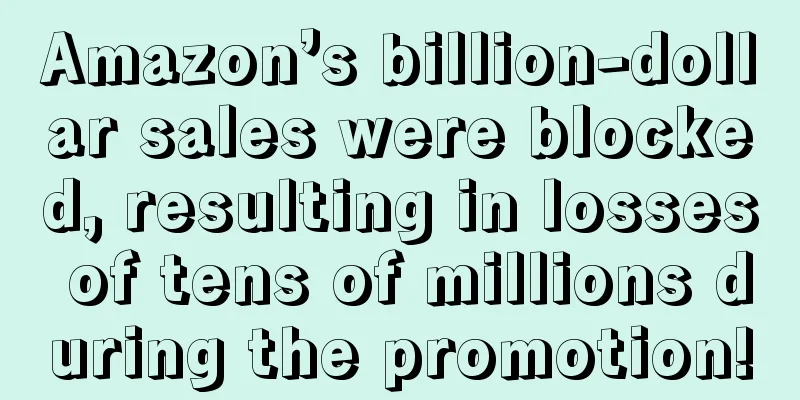Account suspension warning! A large number of Amazon sellers were affected, and some were fined more than 80 million!

|
Right after Prime Day, my brother-in-law started settling scores. Recently, a large number of feedback comments from Amazon sellers in the US and Asia were deleted by Amazon . Some sellers also received warning emails from their brother-in-law about fake orders . Some sellers even received warning letters from both the United States and Canada for the same store.
Another Amazon seller said that he also received an email warning that his account was at risk of being deactivated. However, the content of the warning to this seller was slightly different. The email showed that he had violated Amazon's code of conduct . Specific actions included influencing customer ratings and reviews, manipulating sales rankings, and artificially manipulating traffic . The first two points are easy to understand. They may be fake orders before the big promotion on the Member Day. The difference is that the traffic is artificially manipulated. In this regard, some sellers in the industry analyzed that it may be that there are no negative reviews or likes on the homepage , and the likes are clicked very quickly, and the traffic suddenly increased in one or two days. There are also sellers who said that they did not fake orders, but received the same email and account rating risk warning .
In addition, even the reviews of some sellers who were listed through the early reviewer program were deleted . It is reported that the seller said that he had posted four reviews through the early reviewer program, but found that one of them was deleted early the next morning. As we all know, early reviewers post reviews, which is a compliant channel allowed by Amazon, so how could it be deleted? In this regard, some sellers believe that it was a robot that mistakenly killed the review, while others questioned whether the seller was fake . Regarding the issue of many sellers receiving small red flags recently, some sellers believe that it is caused by the high natural review rate , or that the keywords requested for reviews were detected by Amazon and triggered warnings.
Amazon has been cracking down on fake reviews for a long time, but it seems that it can’t stop sellers’ enthusiasm for fake reviews !
Recently, the monitoring service agency Fakespot discovered that fake reviews on Amazon's website surged during the outbreak of the new coronavirus pandemic, reaching levels typically seen during the holiday shopping season and setting a record in the company's history . Fakespot evaluated 720 million Amazon reviews from March to September and found that about 42% were fake , up from about 36% in the same period last year. By comparison, about 36% of Walmart.com reviews evaluated by Fakespot during the same period were fake, roughly the same as last year. Khalifa, founder of Fakespot, said, “We have only seen such numbers during Black Friday or Christmas in 2019. The surge in fake reviews in 2020 is closely related to the epidemic blockade measures in the United States.” Khalifa cited the example of one of Amazon's masks being rated 3.9 stars , most of which were provided by members of Amazon's Vine review program, who are Amazon's "most trusted reviewers." One of the members claimed to have evaluated 9 products that day, for a total of 1,348 products . “No one ever has the time to review that many products that are so obviously fake ,” Khalifa said. He said that although he believes Amazon conducted a cleanup in September, the number of unreliable reviews found by Fakespot is still the highest the company has ever recorded. Based on past experience, Khalifa expects the number of fake reviews to increase as Amazon enters the holiday shopping season. During the peak season every year, Amazon cracks down on a wave of violations of its review policy, and some sellers have been fined $12.8 million. Previously , an Amazon seller faced a fine of up to $12.8 million ( about 85 million yuan ) for allegedly creating false reviews of weight loss pills . It is reported that the seller paid a third-party website to write and publish fake reviews on Amazon.com. The seller bribed the website to increase the rating of his products to 4.3 or 5 stars and asked to keep his products at an average of 5 stars. In response, the US Federal Trade Commission ( FTC) decided to impose a fine of $12.8 million ( about 85 million RMB ) on the Amazon seller. However, if the company is willing to pay a $50,000 fine ( 37,551 GBP) to the FTC and fulfill other tax obligations, the fine will be suspended. In addition, the FTC stated that if merchants deliberately conceal their financial situation, all these fees will be paid as scheduled. The FTC has ordered the seller to send an email to the shopper who purchased the product explaining the incident. The regulator also requires the seller to notify Amazon and confirm that they left fraudulent feedback. In response, Amazon said it would suspend the accounts of sellers who violated platform policies and ban sales. Deleting reviews during the peak season is something Amazon does every year. Previously, Amazon UK deleted 20,000 fake reviews, and a group of sellers were banned. Therefore, sellers should be careful when doing reviews during the peak season to avoid being banned! |
>>: Brexit deadline! Changes for European sellers
Recommend
What is lucyees? lucyees review
Lucyees offers customers a wide range of pet produ...
The year-end general account is in disarray and the balance is abnormal! The aftermath of Amazon's delayed payment? !
The impact of Amazon’s delayed payment policy, wh...
What is MyOnlineStore? MyOnlineStore Review
MyOnlineStore can help you quickly create an onlin...
What is Anti-fake Code Verify? Anti-fake Code Verify Review
Anti-fake code verify is a third-party plug-in in ...
TikTok marketing is all the rage in the fashion industry! It may become the next growth engine for fashion e-commerce
<span data-shimo-docs="[[20," ","...
What is ZoMaTo? ZoMaTo Review
ZoMaTo is a search engine site that provides users...
Walmart to invest nearly $1.5 billion in Mexico and Central America to strengthen logistics supply chain
It is learned that according to foreign media repo...
How to modify the Amazon brand name?
A brand is a name that represents a product or a g...
Amazon launches a heavy-handed crackdown on reviews! The FBA system continues to “slim down”
Today, Amazon issued an announcement stating that ...
Reversal! USPS resumes accepting packages from China
It is learned that on February 5, local time, the ...
The most detailed Amazon operations manual ever
What I want to share with you today is the most d...
This week, there are a few things Amazon sellers must pay attention to!
Last week, Amazon announced that this year’s Prime...
Shein raises $2 billion in new round of financing, valuation shrunk by one-third
It is learned that on May 17, the Wall Street Jour...
I was cheated out of 60,000 yuan! After the seller asked the service provider to delete the negative review...
What is the most annoying thing about selling on A...
Is the era of universal cross-border trade coming? The number of third-party sellers on Amazon exceeds 6 million!
As the saying goes, " If there is no frost an...









